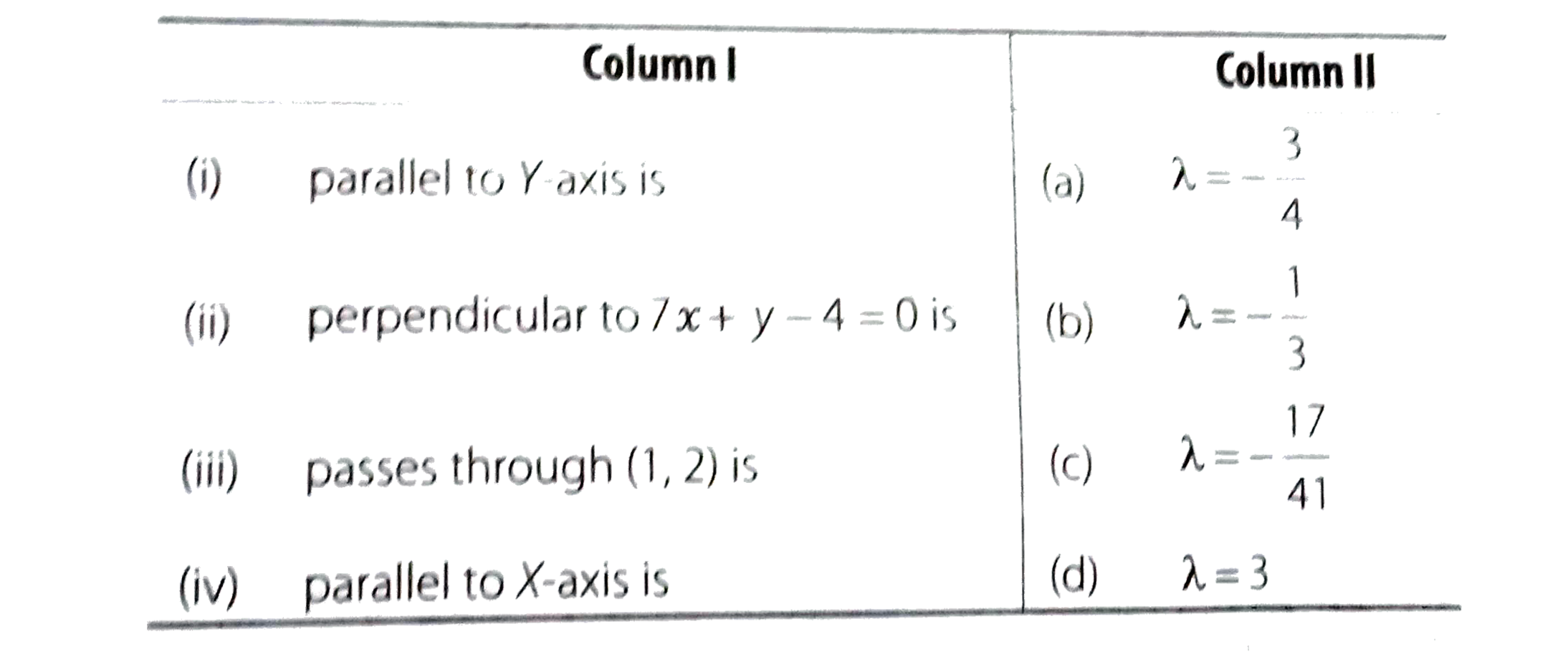Find all values of λ for which the (λ−1)x+(3λ+1)y+2λz=0(λ−1)x+(4λ−2)y+(λ+3)z=02x+(3λ+1)y+3(λ−1)z=0 possess non-trivial solution and find the ratios x:y:z, where λ has the smallest of these value.
3:2:1
3:3:2
1:3:1
1:1:1
The correct Answer is:D
To solve the problem, we need to find values of λ for which the following system of equations has a non-trivial solution:
1. (λ−1)x+(3λ+1)y+2λz=0
2. (λ−1)x+(4λ−2)y+(λ+3)z=0
3. 2x+(3λ+1)y+3(λ−1)z=0
Step 1: Form the Coefficient Matrix
We can express the system in matrix form as follows:
⎡⎢⎣λ−13λ+12λλ−14λ−2λ+323λ+13(λ−1)⎤⎥⎦⎡⎢⎣xyz⎤⎥⎦=0
Step 2: Set Up the Determinant
For the system to have a non-trivial solution, the determinant of the coefficient matrix must be zero:
D=∣∣
∣∣λ−13λ+12λλ−14λ−2λ+323λ+13(λ−1)∣∣
∣∣=0
Step 3: Calculate the Determinant
We can calculate the determinant using cofactor expansion.
D=(λ−1)∣∣∣4λ−2λ+33λ+13(λ−1)∣∣∣−(3λ+1)∣∣∣λ−1λ+323(λ−1)∣∣∣+2λ∣∣∣λ−14λ−223λ+1∣∣∣
Calculating each of these 2x2 determinants:
1. ∣∣∣4λ−2λ+33λ+13(λ−1)∣∣∣=(4λ−2)(3(λ−1))−(λ+3)(3λ+1)
2. ∣∣∣λ−1λ+323(λ−1)∣∣∣=(λ−1)(3(λ−1))−(λ+3)(2)
3. ∣∣∣λ−14λ−223λ+1∣∣∣=(λ−1)(3λ+1)−(4λ−2)(2)
Step 4: Solve the Determinant Equation
After calculating the determinants and simplifying, we set D=0 and solve for λ. This will yield values for λ.
Step 5: Find the Ratios x:y:z
Once we have the values of λ, we substitute the smallest value of λ back into the original equations to find the ratios x:y:z.
2. (λ−1)x+(4λ−2)y+(λ+3)z=0
3. 2x+(3λ+1)y+3(λ−1)z=0
We can express the system in matrix form as follows:
For the system to have a non-trivial solution, the determinant of the coefficient matrix must be zero:
∣∣λ−13λ+12λλ−14λ−2λ+323λ+13(λ−1)∣∣
∣∣=0
We can calculate the determinant using cofactor expansion.
2. ∣∣∣λ−1λ+323(λ−1)∣∣∣=(λ−1)(3(λ−1))−(λ+3)(2)
3. ∣∣∣λ−14λ−223λ+1∣∣∣=(λ−1)(3λ+1)−(4λ−2)(2)
After calculating the determinants and simplifying, we set D=0 and solve for λ. This will yield values for λ.
Once we have the values of λ, we substitute the smallest value of λ back into the original equations to find the ratios x:y:z.
Topper's Solved these Questions
- DETERMINANTBOOK - CENGAGE ENGLISHCHAPTER - DETERMINANTEXERCISE - Comprehension
2 Videos
- DETERMINANTBOOK - CENGAGE ENGLISHCHAPTER - DETERMINANTEXERCISE - Multiple Correct Answer
5 Videos
- DEFINITE INTEGRATION BOOK - CENGAGE ENGLISHCHAPTER - DEFINITE INTEGRATION EXERCISE - JEE ADVANCED
38 Videos
- DETERMINANTSBOOK - CENGAGE ENGLISHCHAPTER - DETERMINANTSEXERCISE - All Questions
264 Videos
Similar Questions
The system of homogeneous equation λx+(λ+1)y+(λ−1)z=0,(λ+1)x+λy+(λ+2)z=0,(λ−1)x+(λ+2)y+λz=0 has non-trivial solution for :
View SolutionThe value(s) of λ for which the system of equations
(1−λ)x+3y−4z=0
x−(3+λ)y+5z=0
3x+y−λz=0
possesses non-trivial solutions .
View SolutionThe values of θ, λ for which the following equations sinθx−cosθy+(λ+1)z=0 , cosθx+sinθy−λz=0 , λx+(λ+1)y+cosθz=0
have non trivial solution, is
View SolutionThe value of the λ if the lines (2x+3y+4)+λ(6x−y+12)=0 are

View SolutionThe set of all values of λ for which the system of linear equations
x−2y−2z=λx
x+2y+z=λy
−x−y=λz
has a non-trivial solution
View SolutionFind the range of values of λ for which the point (λ,−1) is exterior to both the parabolas y2=|x|.
View SolutionFind the range of values of λ for which the point (λ,−1) is exterior to both the parabolas y2=|x|.
View SolutionFind the value of λ for which the plane x+y+z=√3λ touches the sphere x2+y2+z2−2x−2y−2z=6.
View SolutionFind the range of λ for which equation x3+x2−x−1−λ=0 has 3 real solution.
View SolutionThe values of λ for which the function f(x)=λx3−2λx2+(λ+1)x+3λ is increasing through out number line (a)λ∈(−3,3) (b) λ∈(−3,0) (c)λ∈(0,3) (d) λ∈(1,3)
View Solution
